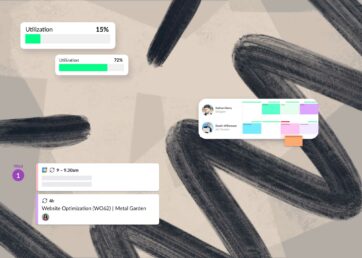Let’s face it. Job interviews can be stressful. But it’s natural to feel anxious before a job interview—most of us do (a whopping 93% of us in fact). But those nerves aren’t all bad. It shows you care about the job and that you’re motivated to succeed. Plus, that very nervousness is what often encourages you to do the prep work necessary to land that dream job of yours.
During the Great Resignation, employees left toxic workplaces and hustle culture behind in favor of work-life balance and more fulfilling jobs. Because of that shift, job interview questions have changed. These days, it’s about finding the right team fit, fueling career growth, and having a healthy work environment. After all, project manager roles have long been characterized by unrealistic deadlines, tight budgets, and stressful work environments.
No more.
Today, amid plenty of layoffs—especially in tech—there’s no shortage of talent. So as a project manager ready for a new challenge, how can you stand out in your job search?
The answer? Preparation. Whether you’ve been affected by recent layoffs or simply looking to make your next career move, this guide will help you navigate the interview process and spot red flags along the way.
In this article 📖
21 project management interview questions to think about
Before we dive into our project manager interview questions, let’s start by talking about the hiring process. Companies that truly understand the importance of good project management will have a streamlined hiring process with a few rounds of interviews with different stakeholders. You’ll likely meet the hiring manager, a peer or team member, a People Ops or HR manager, and a member of leadership.
Red flag alert: If the hiring process is disorganized or out of sync with current best practices, that’s your first clue that a project manager position with that organization may not be for you.
It’s also common for companies to divide their hiring process into stages. For a project manager, the interview process could look something like this:
- Initial interview with HR or hiring manager
- Mock project or home assignment
- Meet more team members to assess culture fit
- References
- Offer
The most common project management roles are project manager, assistant project manager, senior project manager, director of program management, project coordinator, and team leader. Depending on the position you’re applying for, questions and conversations will vary.
Ultimately, interviewers are looking for the qualities that define a project leader—industry knowledge, problem-solving skills, adaptability, time and resource management, critical thinking, along with soft skills.
Alright, let’s get started with your first set of project manager interview questions.

Typical introductory questions for project managers
During the introductory round, or your first call with the company, the interviewer will ask screening questions designed to weed out applicants who don’t have the qualifications or experience to meet the requirements of the job. Recruiters view this stage as a means to get to know candidates, their personalities, working styles, and what they’re looking for in their next role.
But remember – it’s a two-way street. This is also an opportunity for you to assess whether the company is right for you at this stage of your career. (More on this later!)
1. Tell us a little bit about yourself and your background.
Make the introductory question an opportunity to showcase the best parts about working with you, but focus on your core skills. You could be a great team player, an excellent time manager, or a technological wizard who knows how to use the best tools and bring projects across the finish line.
Instead of a long-winded explanation, give the recruiter a concise walkthrough of your personal and professional journey, highlighting your core qualifications, milestones, talents, and achievements along the way. A succinct answer displays excellent communication skills, an important trait in a project manager.
Pro tip: Sometimes, it can be hard to know how to start answering this question, especially if you’ve been in project management your whole career. So prepare an opener for your introduction in advance. It could be as simple as:
- “I became interested in project management when…”
- “I started my career as a…”
- “I first led a project team when….”
Choose a key moment and go from there so you don’t stumble.
2. Why do you want to work at our company?
Most recruiters ask this open-ended question not because they want you to sing their praises, but to check if you’ve done your homework. The way you answer this question demonstrates your interest in the company and the role you’re interviewing for. Plus, it shows that you’re proactive and able to stay on top of tasks. Bonus points, incoming!
Do your homework and read about the company before the interview. Review the company website, blog, and online reviews to get a feel for the company’s culture, values, product, and reputation. Cultural fit is important to everyone, so ask about it early in the process.
Even though the question is focused on why you want to work at the company, your answer should also tell the hiring team why they need to hire you. So, highlight why you’re passionate about joining the team—maybe you’re excited by the mission-driven product or service, the values, or the responsibilities of the role. Be specific and personalize your response. And, if you don’t feel excited by a single aspect, think harder about whether the job is the right one for you.
Pro tip: Even though salary, title, and benefits are important, don’t mention them as reasons for your desire to work at the company. Want to ask about those things without actually mentioning them? Ask more detailed questions about company culture.
3. Tell us about your most successful project to date.
Recruiters want to hire a project manager who’ll be excited and engaged in the company’s projects. To assess your strengths and preferences, they may ask you to describe a previous successful project or to imagine an ideal project. Simply put, they want to see if you’d be a good fit for their work environment and the type of projects they have.
The best way to answer questions like these is to respond honestly. Point out key features of the project plan and the aspects you enjoy. Highlight how you handle challenges and the solutions you apply to make projects successful. This provides insight into your abilities and strategic thinking and, in the case of past projects, your experience.
Pro tip: Make a list of the best projects in your career and pick the one that best reflects your role in the success of the project.
4. What’s your management style?
Companies want to hire project managers who motivate their teams, not bosses who micromanage. When an interviewer asks about the type of manager you are, they want to understand your approach to managing a team, building morale, and helping team members grow.
The ideal answer is always an honest one. So what does that mean? Be realistic about your strengths and weaknesses and acknowledge the areas you’re working on. This will earn you points for self-awareness and show a willingness to improve.
For instance, if you’re uncomfortable with confrontation and don’t like “hard conversations” about deadlines or quality, you could say that you tend to operate from a place of empathy, and your instinct is to provide additional support to a struggling teammate because you want to help improve their productivity.
Pro tip: Give specific examples of your leadership style by mentioning techniques you use for conflict resolution or to boost team performance, like huddles, peer coaching, mentoring initiatives, happy hours, etc. And lastly, make it clear that you’re not this guy. 👇

5. Have you managed remote teams?
In the last two years, companies have realized the benefits of remote work. So it’s becoming more common to ask about a candidate’s remote work experience. Remote project management is a complex mix of scheduling, task management, budget management, collaboration, and reporting. You’ve got to keep projects moving despite the typical remote challenges.
If you have experience managing remote or hybrid projects, say so. If you don’t, highlight the qualities that would make you successful at remote project management, like organizational skills, a knack for promoting work-life balance, or a leadership style based on expectation setting.
Pro tip: Talk to someone in your network who has managed remote projects and make a list of relevant skills that would make you an effective project manager.
6. Are you interviewing with other companies?
This question is not meant to trick you. Most recruiters ask about your other prospects to better gauge their own needs. For example, they may need to speed up the hiring process or provide a counteroffer to a competitive candidate.
The best way to answer this question is to be upfront about your options. This is true whether you’re being picky about where you apply or are singular in your focus with one company at a time.
Pro tip: Even if you’re interviewing elsewhere, bring the focus back to the role you’re currently interviewing for and why you want to work at that company.
7. What are your salary expectations and when are you available to start?
It’s better to align on salary expectations before you get too deep into the hiring process. This helps you both decide whether it’s worth moving forward.
While some companies publish their salary (or a range) with their job posting, many prefer to interview the candidate before making an offer. Some recruiters mention a salary range during the initial phone screen, so there’s flexibility for the right candidate. Either way, ask for a ballpark range so there are no shocks in store and no time wasted.
Respond with the salary or range you’re expecting and tell them if you’re open to negotiation. If the recruiter asks you about your expectations without providing a range, ask them about their budget. If you’ve done your research, you’ll know right away if it’s worth moving forward.
Pro tip: Research salaries in your industry through job sites like Glassdoor and Indeed, so you’re not underquoting your compensation for your location or desired role. Also, more and more companies, especially in tech, are now offering location-independent salaries, so don’t be afraid to ask for what you’re worth – regardless of where you’re based.
Project manager work experience questions
Interviews have evolved from simply asking how many years you’ve spent in the industry to more behavioral-style questions, often using the STAR method.
STAR stands for situation, task, action, and result and helps recruiters dig deeper into your qualifications, past performance, working style, resilience, problem-solving skills, and soft skills by asking about real-world scenarios.
McKenna Murray, a business intelligence consultant at Ingram Micro, agrees, “Our education, certifications, and overall stats are great on our resumes, but there isn’t nearly enough room on one page to convey the successes, lessons learned, and the full breadth of what we’ve worked on in the past—every project has its own intricacies.” Murray says she likes behavioral interview questions like the STAR method because it paints a clearer picture of her experience.
8. Tell us about a challenging project.
Challenges are a part of project management and business, and potential employers want to know if candidates can weather the storm and stay on schedule.
Prepare for common interview questions about overcoming challenges with a specific example from your career. Give the interviewer an overview of the project goals, project schedule, and the problem. Then explain your thought process and the solutions that brought the project to success.
Pro tip: Carefully read the qualifications and skills listed in the job description, and make a list of situations where you displayed those skills. Use the one that best demonstrates your qualifications as a successful project manager.
9. Tell us about a time a project failed and how you handled it.
Success/failure questions are stereotypical interview questions, but they actually say a lot about you as a candidate. They can also be turned into a great opportunity to learn more about the team you’re interviewing with, too.
By explaining what you define as a failure, you’re communicating your own management philosophy and can take the chance to talk about what you’ve done to re-examine those points of failure on a project and improve your process to help change that moving forward.
For example, you might consider a project a failure if your team comes out of the work exhausted and burned out, even if it launched on time and on budget.
Pro tip: Being able to explain why you consider certain things failures (and how they might have gotten to those points) says a lot about your views on project processes – but also speaks volumes about you as a project leader.
10. Tell us about a time you successfully won over an unhappy customer.
Similar to the previous question, the goal of this question is to evaluate your soft skills and your ability to solve customer-facing issues.
Use the STAR method to prepare your answer by explaining the situation, the task (making the customer happy), the actions you took, and the result. Include measurable outcomes, like customer retention or an upsell as a result of your solutions.
Pro tip: Maintain a positive outlook while talking about challenging situations and focus on the lessons you learned from them.
11. How do you allocate resources and prioritize tasks?
Project management is often about juggling multiple tasks and handling competing priorities. Questions about resource allocation and prioritization are a great opportunity to provide evidence of your resource management powers and to check if your philosophy aligns with the organization.
You can show industry knowledge and depth of understanding by mentioning prioritization techniques like the Kano Model, which grades tasks based on their ability to satisfy customers. Or bring up the MoSCoW method as a way to divide tasks into must-have, should-have, could-have, and won’t-have buckets.
Assuming you’re a project manager who values work-life harmony (don’t we all?), you want to touch on your broader philosophy about monitoring resource utilization rates and team availability. This way, you’re not playing a part in over allocating people and creating a stressful work environment.
Pro tip: Read about the correlation between resource overallocation and employee burnout so you have data to back yourself up.

12. How do you handle scope creep?
Scope creep happens when there’s no project scope and you don’t have a clear idea of the requirements and deliverables involved to deliver a project. As a result, more and more tasks get added to the point where the project becomes unmanageable. Most projects will deal with scope creep to some extent, it’s how you manage it that matters.
All project managers will encounter scope creep at some point in their careers – it’s unavoidable. Share an example of why it happened, how you handled it, and what the outcome was to help the hiring team better understand the full breadth of your skills.
Pro tip: Focus on how you get ahead and prevent scope creep rather than how you tackled it when it happened. This will demonstrate your analytical and risk assessment skills.
13. How do you avoid gold plating?
Gold plating can be tempting, especially if you’re on a client-facing team. You want to impress a client by adding extra features or designs to show that you go above and beyond. But often, all you’ll end up doing is creating extra work that might go unnoticed by the client, or worse – it could upset the client because you’ve made changes they haven’t approved.
But similar to scope creep, you can avoid gold plating by firmly sticking to your defined project scope. If you keep an eye on the key deliverables for a project, a skilled project manager can quickly detect gold plating.
Pro tip: Share a story about a time you spotted gold plating and how you prevented it.
Skills-based or technical interview questions
As you progress to new rounds of the hiring process, you may encounter project management-specific questions, especially if the company has a “technical” interview. Get up to speed on common concepts and methodologies used in the industry with this quick review.
14. How do you define the scope of a project?
Different deliverables make up a project, and scope management involves pinpointing those deliverables in a statement of work to stay on track.
15. Walk us through the team development process you follow in project management.
Every project needs a team, and scheduling the right talent at the right time is crucial to project success. In technical terms, forming, storming, norming, performing, and adjourning are the five stages of the team development process.
16. Which processes and process groups are part of a project management framework?
Traditionally, project management is divided into five process groups—initiating, planning, executing, controlling, and closing—that represent each stage of a project.
17. Which project management tools are you familiar with?
A good project manager can adapt to new software and processes. Familiarize yourself with a few tools and name three key features that are non-negotiable in project management software. This shows your technical skills and familiarity with using software, proving that you understand project management needs.
Team and culture questions
There’s no “I” in team. At least that’s how the saying goes. But controversially, there are actually plenty of I’s on a team. And we all have individual needs and criteria that allow us to perform at our best and contribute to the success of a project.
So these questions are key. As a project leader, how do you lead your team?

Pro tip: This is not the energy you want your team to give off.
18. What’s important to you when you first join a team as the new project manager?
When joining any team, the most important part is to get to know and understand people on an individual level. This is the only way to uncover how they prefer to communicate, what motivates them, and what frustrates them – all the things that will contribute to making the team successful.
Pro tip: Focus on making it clear to the interviewer that you understand the importance of getting to know and supporting your team members. Why? Because that’s the best way to set you up for project success in the long term.
19. What’s your communication style with your team?
The interviewer wants to get a better understanding of your communication skills and be reassured that you’re an effective communicator who can motivate your team. As always, examples come in handy. Share your processes from joining teams in the past and how you’ve communicated from the start and throughout a project.
Pro tip: If possible, use an example that demonstrates how you engage with your team and foster communication between team members as well. Because it’s not just about how you communicate with your team, it’s how they communicate with each other.
20. Have do you deal with underperforming team members?
Any good leader takes responsibility for underperforming team members. Why? Simple. It’s their job to enable them to do their job successfully. So when asked this question, whether you’ve dealt with it on a project or not, take responsibility. Perhaps you were misaligned on priorities and responsibilities? Perhaps they were booked on the wrong project?
Pro tip: Say that you’d start with having a conversation with the team member in question, but before that happens, review both the project scope and the employee profile to uncover if there’s been a mismatch between project needs, skills, and experience.
21. How do you manage team happiness?
A happy team often leads to great project outcomes, and as a result – happy clients. Managing team happiness can be difficult as there are many factors at play. But as a project manager, it’s your responsibility to keep your team happy, healthy, and productive.
That starts with resource allocation. Make sure you have the right people with the right skills on your team. But it’s not just about skill sets, you also want to be sensible with how you utilize your resources and their time.
Pro tip: Read about the correlation between resource overallocation and employee burnout so you have data to back yourself up.
Interviews are a two-way street
While interviews can be a tedious exercise, they’re also a great opportunity to evaluate the company you might be working with and the position you’re hoping to be hired for. An indicator of a good fit is the type of questions you’re asked during the hiring process —and what kind of conversations are sparked out of those.
Great interview questions are conversation starters
The best interviews feel like conversations – not interviews (let alone cross-examinations). Sure, the conversations should be centered around project management, processes, and goals – but if you don’t feel comfortable in an interview – do you really want to work with those people?
Probably not.
You want to know that your position will be valued and that the company understands your strengths, along with where and how you can excel in your role, and how you’ll be able to contribute to the team.
These things are crucial when it comes to long-term fit and more importantly – employee happiness.
Spot red flags
The questions asked during project management job interviews are also a great indicator of potential red flags within a company, especially surrounding their project management practices.
Watch out for:
- Biased questions (you often spot these through leading questions)
- Questions around budgets and timelines but with no context given
- No questions about your project success history (they might not care about client relationships)
- No questions about your process
Sometimes, companies or hiring managers might be looking for someone to justify their expectations of project needs without having an understanding of project management as a profession.
One word: Run.
Finding the right fit
Ultimately, you want to work for a company that sets you up for success with sound resource management practices, a laser focus on capacity planning, and great respect for employee work-life balance.
Because it’s no longer just about finding the right role. It’s about finding the right overall fit. That includes the right team, the right manager, the right pay, work/life balance, career growth, and opportunities for professional development. In 2022, we’ve finally started to move towards actually catering to the needs of our employees and enabling them to be happy and successful—and it was about time.
Let’s keep improving.





